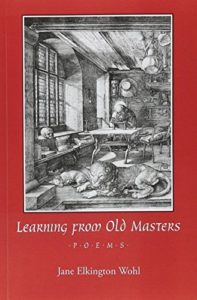Learning from Old Masters
Reviewed by Catherine Wald
November 1, 2016
 By Jane Elkington Wohl. Fithian Press, 2016. 76 pages. $14/paperback.
By Jane Elkington Wohl. Fithian Press, 2016. 76 pages. $14/paperback.
Buy from QuakerBooks
This book is aptly titled. The author, a member of Philadelphia Yearly Meeting who lives in Wyoming, firmly places herself among a long poetic and artistic tradition. She acknowledges her debts to various predecessors and celebrates the continuation of the poetic quest in traditional forms, especially sonnets, while also showing a mastery of blank verse. (Her ghazals may push the envelope of this traditional Persian form a bit too far, but the result is hauntingly beautiful, so why complain?)
The title piece is a nod to a well-known Albrecht Dürer engraving that simultaneously portrays her own hands-on, present-day experience and Dürer’s laborious engraving process. By bringing her daughter into the narrative, Wohl shows her intent of passing her love of art down to future generations.
Other artists Wohl invokes include the Lascaux cave painters, Leonardo da Vinci, Andy Warhol, Bernini, Bach, Verdi, and Mozart. I appreciate the range of her cultural knowledge, along with the fact that they are still accessible to readers who may not recognize every reference.
This is a subtle, well-crafted collection that, while celebrating its lineage, also deftly uses contemporary language to express spiritual experience. An example is found in the poem “Cape Cod”:
You hadn’t meant to be a sailor, any more than I meant
to be a poet, but aimlessness is never as undirected
as it seems and words connect like constellations
sailors read at night, the dipper of the southern cross,
depending on the hemisphere.
Another is in the poem “Easter Morning”:
They surround us, these complexities
and contradictions. One Life
necessitates One Death, and yet,
even now, in wind edged with ice,
tulips push through dead leaves.
The search for the sacred through art runs like a musical refrain through this book. It’s a welcome addition to Quaker literature, which needs more examples of how worship and art can find harmony and work together toward similar goals. For Wohl, the touch of God’s hand may be just out of reach, but there is still great delight in pursuing it. In “Four Sacred Songs” she says, “It is only on the breath that song survives / No one wanted to breathe too much but felt / it was just within our fingers’ reach.”



Comments on Friendsjournal.org may be used in the Forum of the print magazine and may be edited for length and clarity.